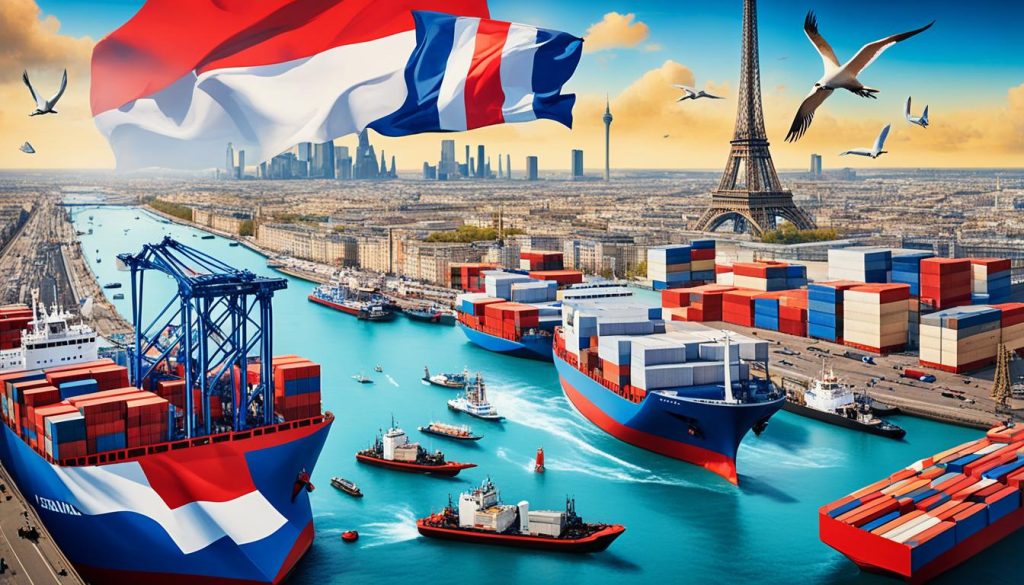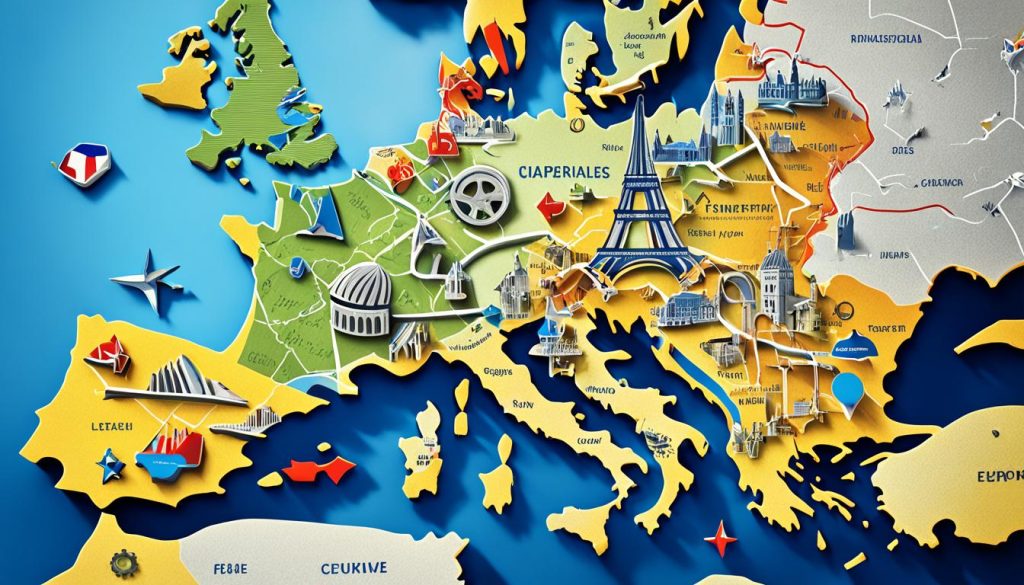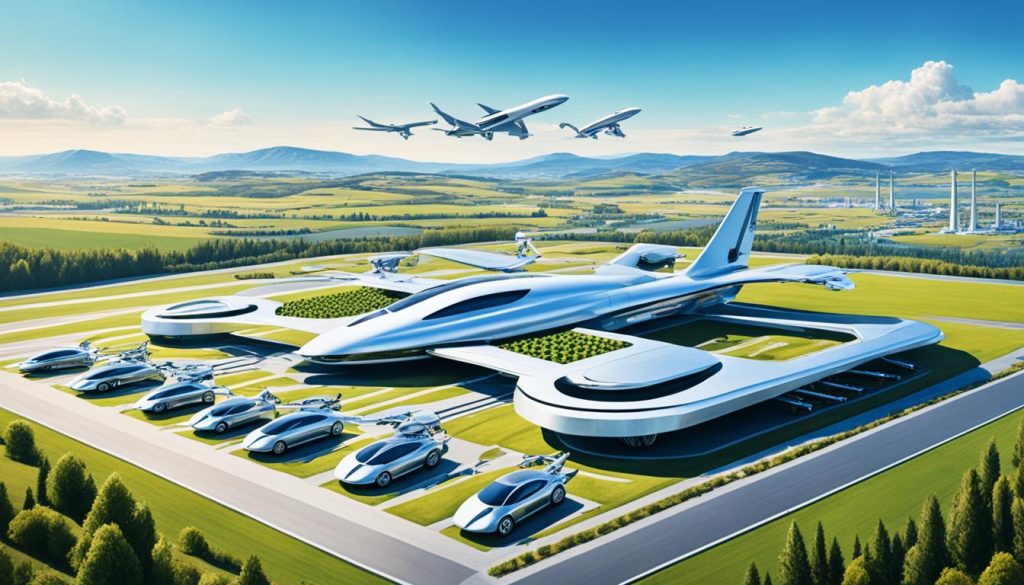France’s economy is a key player in Western Europe. It’s the world’s seventh largest by nominal GDP and ninth largest by PPP in 2024. With 68,373,433 people, it has a nominal GDP of $3.130 trillion and a PPP GDP of $3.988 trillion.
- The Diverse and Robust Economy of France
- France’s Position in Global Trade
- Significant Contributions of Major French Corporations
- France’s Role in European and Global Organisations
- Paris: The Financial Hub and Leading Global City
- France’s Ranking in Global Competitiveness
- Impact of the High-Income Economy on Social Welfare
- Key Industries Driving Growth in France
- The Influence of Historical Economic Policies
- France’s Exceptional Infrastructure and Innovation
- Source Links
The country enjoys steady GDP growth and is 23rd worldwide in GDP per capita. Although agriculture makes up a small part of its GDP, France is the top agricultural power in the European Union. The service sector takes up 78.8% and the industrial sector 19.5% of the GDP. This mix makes France’s economy strong and diverse.
Paris, as the financial centre, plays a big role in the country’s GDP. It’s known globally as a significant city.
Key Takeaways
- France is the seventh-largest economy globally by nominal GDP.
- It ranks ninth by PPP, reflecting its strong purchasing power.
- France’s economy is well-diversified, with significant contributions from the service and industrial sectors.
- Paris, France’s financial hub, is a major contributor to the nation’s GDP.
- France maintains its status as the European Union’s foremost agricultural power.
The Diverse and Robust Economy of France
France boasts a multifaceted, strong economy, with well-spread sectors. This mix ensures steady growth and economic health. As the world’s seventh-largest economy, France excels in services, industry, and agriculture.
Service Sector Dominance
The service sector is France’s economic backbone. It made up 78.8% of the GDP in 2017. This sector covers finance, retail, healthcare, and tourism.
Cities like Paris lead in finance and luxury tourism. This helps France’s service industry grow and hold a strong place in the economy.
Industrial Sector Contributions
The industrial sector is key to France’s economy. It’s 19.5% of the GDP. Important industries include machinery, automobiles, chemicals, electronics, and aircraft.
Companies like Airbus and Renault are global champions. Their innovation and skill strengthen France’s economic position.
Agricultural Influence
Agriculture, though only 1.7% of the GDP, is vital. France leads in agriculture within the EU. It’s famed for its wine, dairy, and cereals.
This sector boosts France’s exports and food security. It’s essential in France’s diverse economic mix.
France’s Position in Global Trade

France is key in global trade, showing its power in Europe’s economy. It exports many goods and has strong import partners. This makes France’s trade abilities stand out.
Key Export Goods
France’s global trade strength is in its French export goods. It exports things like machines, planes, and chemicals. France is known for its advanced industry and tech globally.
Main Export Partners
Who France trades with is vital to its economy. Its top export places are:
- Germany
- Spain
- Italy
- The United States
- Belgium
- The United Kingdom
This network of partners boosts France’s competitive edge. It shows France’s big role in trade both regionally and worldwide.
Leading Import Goods and Partners
France also imports a lot to help its economy. Key imports include machinery, vehicles, oil, and chemicals. It gets these from important partners, which are:
- Germany
- Belgium
- The Netherlands
- Italy
- Spain
Such import partners in France mean constant supply of crucial goods. They back industrial and economic work throughout France.
Significant Contributions of Major French Corporations
France shines on the global stage, thanks to its cutting-edge companies. In 2020, 31 French giants landed on the Fortune Global 500 list.
AXA, Airbus, L’Oréal, TotalEnergies, and Vinci are among the giants. They lead in insurance, air travel, beauty, energy, and construction.
AXA is at the forefront of insurance, offering innovative risk management. Airbus has transformed air travel with its advanced aerospace tech.
L’Oréal leads in beauty, setting trends worldwide. TotalEnergies is a key player in sustainable energy, leading with innovative projects.
Vinci excels in constructing major projects across the globe. These leaders highlight France’s role in driving the global economy forward.
France’s Role in European and Global Organisations

France plays a big part in the world, helping countries work together and grow economically.
Membership in the EU and WTO
France is a key member of the EU and WTO. It influences trade rules around the world. This shows its commitment to free trade and boosting the global economy.
Participation in the G-20 and G-7
France is deeply involved with the G-20 and G-7 groups. Its participation ensures it helps guide global economic policies. This secures its role as an important world leader.
Involvement in the OECD
The OECD’s home is in Paris, thanks to France. The country’s efforts with the OECD aim to make economic and social conditions better for everyone.
Paris: The Financial Hub and Leading Global City
Paris is a top financial centre and a key global city. It has a huge economic role. The city greatly adds to France’s GDP and is important in world finance.
Several Fortune Global 500 companies are based here. This shows Paris’s power in the world economy.
La Défense Business District
La Défense shows Paris’s strength in finance. It’s in continental Europe and is west of the city centre. The area is filled with international firms, tall buildings, and financial groups.
This district is crucial for worldwide business and finance. It helps Paris influence the global economy.
Role in International Models
Paris plays a big part in global finances. It is known for its strong banking, active stock exchange, and many investment firms. The city attracts companies from all over, making big financial deals possible.
Economic Impact of Paris
Paris does more than just finances; it also drives France’s economy. Its economy includes tech, fashion, luxury, and tourism. The city contributes to almost a third of France’s GDP.
Paris helps the country grow and innovate. Its economic power also reaches beyond national borders, influencing the world economy.
France’s Ranking in Global Competitiveness

France has climbed the global ranks, now standing proudly among the world leaders. It reached 15th in the 2019 Global Competitiveness Report. This rise shows the French economy’s strength and enduring spirit. The economy’s power comes from diverse sectors and a drive for innovation and improvement.
France shines in global business due to its strong focus on research and development. It invests heavily in technology and innovation. This commitment keeps France ahead in the global market, attracting big companies and boosting local businesses.
The progress in France’s economic ranking shows its clever use of technology and solid economic strategies. This success marks France as a top global player, skilled at navigating the complex world business scene.
Impact of the High-Income Economy on Social Welfare
France’s high-income economy greatly benefits its social welfare. It stands out among OECD nations for its efficient system. The nation spends about 31.7% of its GDP on social welfare. This shows France’s dedication to the well-being and security of its people.
The French healthcare system is key to its social welfare. It ensures everyone can get healthcare. This is possible due to the country’s wealth, which supports its public health services.
Unemployment benefits also play a vital role. They help keep individuals and families stable when they’re out of work. This support helps maintain a decent living standard, boosting economic and social stability.
Besides, France’s welfare includes help with pensions, child support, and housing. These supports aim to improve life quality. They show how the nation’s economy backs various welfare needs.
In conclusion, France’s economy boosts its social security. The nation’s wealth supports a strong welfare system. This ensures a good life for its citizens and lowers inequality. France is dedicated to both economic growth and social care.
Key Industries Driving Growth in France

France is growing thanks to many key industries. Each one adds something special to the country’s economy. Industries range from high-tech to luxury goods, leading the way in global markets.
Automobiles and Aerospace
The French automotive industry is known worldwide. Brands like Groupe PSA and Renault are at the forefront. They are celebrated for innovative designs and strong manufacturing. In aerospace, giants like Airbus lead with cutting-edge aviation technology.
Luxury Goods and Fashion
France’s luxury goods market stands for elegance and sophistication. Names like LVMH and Kering are leaders. They drive high fashion, perfumery, and accessories, setting trends and charming customers worldwide.
Technology and Pharmaceuticals
The technology sector in France is booming. Capgemini and Atos are directing digital transformation and innovation. The pharmaceutical industry, with leaders like Sanofi, makes big strides in medicine. They focus on improving health care for everyone.
The Influence of Historical Economic Policies
France’s economic history is shaped by different economic plans. The dirigisme era, from 1944 to 1983, was key. During this time, France’s government had a big role in directing the economy.
The goal of dirigisme was to strengthen national companies. It did this by encouraging businesses to come together and supporting important projects. This was to rebuild France’s economy after the war and promote growth.
But in the early 1980s, things began to change. France started moving towards a market-driven economy. Even though the government’s role got smaller, it still helped guide economic progress and industry growth.
Knowing about these economic policies helps us understand France’s economy today. The mix of government involvement and market reforms made France’s economy what it is now. It affects how things are done today and planning for the future in French economic history.
France’s Exceptional Infrastructure and Innovation
France is known for its top-notch infrastructure. It boasts one of the world’s best high-speed rail systems and vast transport networks. These help link different areas, boosting the economy and tourism.
High-Speed Rail and Transport Networks
The TGV (Train à Grande Vitesse) makes France proud with its fast and efficient service. It links major cities like Paris, Lyon, and Marseille, making travel quicker. France also has excellent roads and airports, ensuring easy movement within and outside the country.
Telecommunications and Digital Economy
France’s telecommunications have greatly advanced, especially with 5G spreading across cities. This strong network supports a growing digital economy, sparking innovation. The growth in digital businesses is supported by well-developed financial markets, strict intellectual property rights, and a focus on new technologies.
France shows its commitment to improving its infrastructure and technology sectors. It keeps investing to stay ahead globally, driving economic success and inspiring others.












